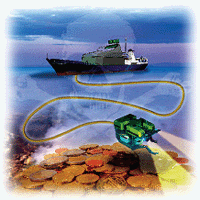
Archaeology Magazine in their July-August 2007 issue has an excellent editorial on the ethical dilemma of treasure hunting. Anyone who knows LAMP knows that we can’t stand treasure hunting, which commercially exploits shipwrecks by digging them up (or blowing holes in them), without the meticulous techniques used by archaeologists, in order to seek profit by selling artifacts. This always results in a loss of knowledge. In contrast, legitimate archaeological excavations use scientifically accepted practices–similar to forensic specialists at a crime scene and in the laboratory–that may be expensive and time-consuming but provide the most information about the past that we can possibly learn from a site. In addition, archaeologists always maintain the entire artifact collection so it can be accessible to the public and may continue to provide knowledge to future researchers.
The author of this editorial uses as an example the 1865 steamship Republic, which was salvaged by the treasure-hunting company Odyssey right here off Florida’s First Coast, though far enough offshore to lie in international waters:
If a private corporation had targeted such an important site on land in the United States and hawked many of its artifacts, heritage activists would have been up in arms, asking hard questions about the commercial exploitation of the country’s cultural history. But there was no public protest over the fate of Republic, and very little criticism in the press. Moreover, this was not an unusual state of affairs—treasure hunters often sell off shipwreck artifacts with scarcely a whisper of opposition. As a journalist who has been writing about archaeology for 25 years, I find this disturbing. Why isn’t there more of a hue and cry against nautical treasure hunting? Why does this industry seem to operate so freely? In search of answers, I began closely examining the problem a year ago. I found, to my dismay, that we have created a bizarre double standard for terrestrial and marine sites, turning a blind eye to the fate of the world’s shipwrecks. In much of the world’s oceans, treasure hunting is a perfectly legal enterprise.
The article points out that Dr. Felipe Castro of Texas A&M University, who was a speaker at our recent Northeast Florida Symposium on Underwater Archaeology back in March, has published two books and 26 scientific articles, along with a thesis and dissertation written by his students, after the excavation of a single shipwreck he directed in Portugal.
By contrast, Odyssey Marine’s work on Republic is little known to the archaeological community—even though, as the company cofounder, Greg Stemm, pointed out to me, “Our budget on a monthly basis is more than the Institute of Nautical Archaeology’s annual budget [at Texas A&M University].” To date, Odyssey’s scientific staff has published just one book—on bottles recovered from the ship. Of the five reports they have written on Republic, none appears to have been published, although the company says it plans to post them online. Moreover, Odyssey has now moved on to other shipwreck projects . . .
I have requested from this particular treasure hunter a final report from a 17th century Spanish shipwreck lost off the Dry Tortugas. I made the request in 1996, and was told that it was being completed and would be available soon. I’m still waiting for it–despite making polite requests every few years. It hasn’t been written, and likely never will.
Treasure hunting is a world where investors are bamboozled, the public is fascinated, and shipwrecks are destroyed in a search for gold–and usually the only ones getting rich are lawyers. All of this happens at the expense of the knowledge that could have been gained from shipwrecks, which, as the article rightly points out, are a limited resource. Like an endangered species driven to extinction, once they are destroyed, they are gone forever, along with the stories they might have told.
Check out the entire article at the link below. Its worth the read, though you might find it a bit depressing . . .
http://www.archaeology.org/0707/etc/insider.html
Meanwhile, Odyssey continues its tragic quest to wring profits from deepwater shipwrecks across the globe–they have recently claimed to have discovered the most lucrative shipwreck ever, worth (according to their statement) over $600 million. This claim, which can’t ever be verified (especially if no reports are written on the salvage activity) sent their stock prices skyrocketing. Disney has even announced they may be producing a film based on these modern-day pirates and their treasure lust. Just what we need . . . more good press for a group destroying our heritage one piece at a time. The only good news is that Spain has recently filed a lawsuit trying to stop their activity. Archaeologists everywhere are keeping their fingers crossed . . . read more about it in a BBC article below:
http://news.bbc.co.uk/2/hi/europe/6705613.stm
(the image above is by Ken Feisel and is courtesy of Archaeology Magazine)

